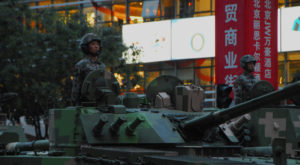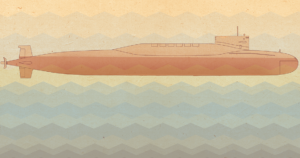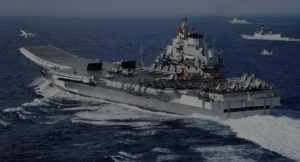Fueled by decades of rapid economic growth and a desire to secure its security interests, China has embarked on a large-scale modernization of its military. President Xi Jinping (who also heads China’s Central Military Commission) has instituted extensive military reforms aimed at streamlining command structures and improving Chinese military strength. China now boasts its first aircraft carrier, a credible fleet of both diesel and nuclear missile submarines, one of the largest air forces in the world, and over fifty intercontinental ballistic missiles.
What do the experts think?

M. Taylor Fravel
Associate Professor in the Department of Political Science, Massachusetts Institute of Technology

Oriana Skylar Mastro
Assistant Professor of Security Studies at the Edmund A. Walsh School of Foreign Service at Georgetown University

Phillip C. Saunders
Director, Center for the Study of Chinese Military Affairs; Distinguished Research Fellow, Institute for National Strategic Studies, National Defense University
Is China a Military Superpower?
Fravel: A military superpower is a country that can project military power around the world to defeat or dominate another country…by this criteria my argument would be that China is not yet a military superpower and may not be one for quite some time Watch
Mastro: We have only ever had one historically, really, and that is the United States. Watch
Saunders: Power projection really distinguishes a superpower—you can go somewhere else and have your military do something. That’s an area where China is pretty far behind. Watch
Does China have the ambition to become a global military superpower?
Mastro: I don’t think China, the party, currently has a global ambition in the military sense. Watch
Mastro: In an ideal world, China feels like it could be and wants to be the regional hegemon in which it has certain expectations, for example, that its preferences are accommodated above all other countries. Watch
Saunders: China doesn’t want the responsibilities that the United States and the Soviet Union took on to try to be the guarantor of order around the world. . . . I don’t think that’s going to change for quite some time to come. Watch
Fravel: The main contingency that animates China’s military strategy today is, fighting and winning what they term ‘informationized local wars’, and that underscores… the regional orientation in China’s military strategy today and not a global one. Watch
What are key areas that China lags the U.S. in military capabilities and where is it catching up?
Saunders: If I look at where they are catching up, their air force and navy used to be way, way behind state of the art standards. Now they have some pretty capable weapon systems and are starting to be able to use them. Watch
Mastro: China hasn’t fought a war since 1979 . . . the United States, for better or worse, has been at war for decades, and with that comes a learning process, a diagnostic process, that [the US has] in place and the Chinese just don’t. Watch
Mastro: China has caught up in a lot of key areas when it comes to equipment. Watch
Fravel: The closer you get to the Chinese mainland, the more advantages China enjoys by virtue of [getting] to conduct military operations from its homeland territory. But China cannot reach out that far yet into the Western Pacific and so the U.S. continues to maintain more advantages the farther you move away from China. Watch
What are the main objectives of Xi Jinping’s military reforms?
Fravel: I think the reforms have had two important goals, both of which are key to improving the operational effectiveness of the PLA as a military organization… The first problem the reforms sought to address was corruption which was viewed as being endemic throughout the PLA…The second goal of the reforms have been trying address has to do with optimizing the structure of the PLA for conducting the types of operations it has said it wants to conduct, and those are joint operations. Watch
Mastro: They have already poured so much time and effort and money into this military modernization, and there is an expectation from the party, but also from the people, that when the time comes the military will actually be able to perform, and there is an intense fear that it won’t be able to. Watch




